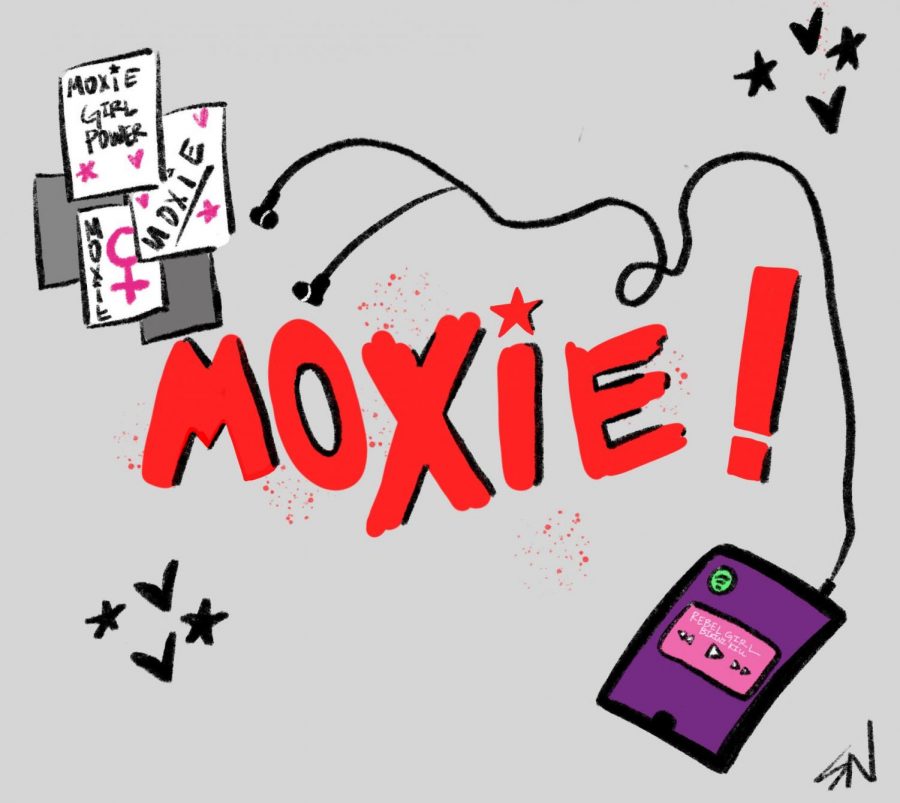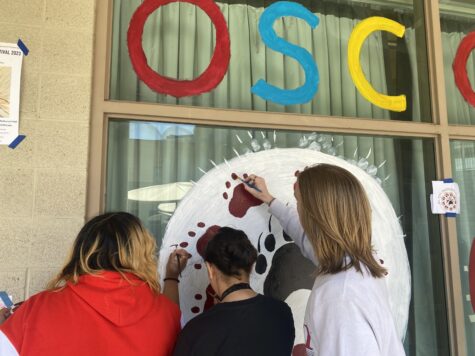“Moxie” lacks authenticity and delivers a manufactured portrayal of ‘feminism’
Amy Pohler’s new Netflix movie, “Moxie,” tried, but missed the mark, producing a contrived film on feminism.
Photo by Sophia Novelo
“Moxie” focused on girl power, but it did so in all the wrong ways.
This film is rated PG-13 as it covers suggestive topics and has mature dialogue
Just in time for International Women’s Month, Netflix released Amy Poehler’s movie adaptation of Jennifer Matthiue’s book “Moxie.” Although the movie was made from the heartful intent of empowering young women with “girl-power” sentiments and rebellious mantras, Poehler misses the mark with this haphazardly thrown together love letter to past feminist movements, delivering a very contrived take on feminism.
“Moxie” follows a mild-mannered, upper-middle-class suburban teenager named Vivian (Hadley Robinson) who finally becomes fed up with the sexist culture at her school. The villainous high school jocks and popular kids led by, you guessed it, the high school football team captain, Mitchell (Patrick Schwarzenegger), create a list that gives the girls of the school abject titles. Once a new student named Lucy (Alycia Pascual-Pena), challenges Mitchell, she then becomes a part of that degrading list as well. The movie then cuts to a pivotal scene where it plays “Rebel Girl” loud and proud by the punk band Bikini Kill, setting the tone for Vivian’s enlightenment and her passionate efforts to create her first issue of zines, a small circulation of self-published work, under the name of, you also guessed it: “Moxie.”
The Riot Grrrl culture and the shuffle of the only two Bikini Kill songs in the soundtrack were heavily influenced by Vivian’s mother (Amy Poehler) who was once-upon-a-time fighting the patriarchy as a punk rock teen. The vague allusions to her mother’s past as a riot grrrl and the excruciating lack of dialogue show a very thin connection between her and Vivian. This dynamic between an ex-riot grrrl mother and her newly awakened teenager was extremely surface-level and poorly written into this one scene where, again, “Riot Girl” accompanies Vivian as she ransacked her room only to conveniently find a briefcase filled with her mother’s original zines and, woah!—Poehler’s old leather jacket with pins and patches! Though the mother heavily influenced her daughter’s feminist ideologies and really propelled Vivian’s character development (or lack thereof), ironically, Vivian was flat-out awful to her mom for most of the movie.
The biggest disappointment of this film is that their efforts to show intersectionality ultimately fell flat; the movie seemed more about Vivian than Moxie. When one girl of the group named Kiera (Sydney Park) goes against Mitchell for an athletic scholarship, the rest of the narrative does not focus on her but instead only on the frustration and discontent Vivian deals with, which was later projected onto her mother and Vivian’s new boyfriend (Nico Higara). Oh yeah, there’s a love interest in this film, and their first “date” quirkily took place at a mortuary. Now that’s punk rock.
Touching back on the absence of intersectionality, the group of girls who coined themselves as Moxie were very diverse and all had different stories, but the writing in this film did not give their stories much justice. They ended up merely artificial and just seemed to play social-awareness bingo. Poehler really tries to dedicate screen time to all kinds of issues in this movie, but she failed to incorporate them in meaningful ways.
“Poehler’s intentions are genuine and the idea is overall thoughtful, but trying to take on a complex movement, like feminism, in a general way that appeals to all women is nearly impossible in one hour and 51 minutes. I applaud her for her inclusion of diversity, but it almost feels as though she claims that all women struggle in the same way. It seems as though she points out every now and then that the main character is a white cis woman with privilege compared to others and feels that’s ‘enough.’ She doesn’t expand on the way that race, sexual orientation, or transition affects women individually but just rather throws them out there,” junior Bri Hernandez said.
When watching “Moxie,” quite a few individual scenes and pieces of dialogue were awkward and created a manufactured representation of fighting against sexism. One scene of the movie was with a girl shuffling a deck of cards when she suddenly has this miraculous realization dawn over her, to which she says: “You know what I just realized? The king is worth more than the queen,” acting like she was the first to come upon this. “Why? The queen is the best.” Surely this movie wasn’t going to use this as something to fuel the fire to take down the patriarchy. Wait, yes it did. Alright! Unfortunately, this wasn’t the only example of cringe-worthy stretches to depict radical feminism.
More towards the beginning of the movie, Lucy tells the teacher that her assigned summer reading for English was just a book written by “rich, old white dudes” for “rich, old white dudes,” and that they should read something else. This might have created a little bit of impact for the audience, but ultimately, it was a lazy example of discontent that didn’t focus on realistic situations and issues women face day-to-day.
“I think that this is a perfect representation of surface-level mainstream feminism, because it’s being told from the point of view of a white girl who doesn’t actually experience any of the sexism portrayed first hand. Every example of harassment is against the poc side characters and the trans girl, who is arguably the most interesting character in the movie, but since Vivian is the only one writing the zines, everything is funneled through her observation of sexism and therefore conveyed in a very surface-level way, especially when using keywords like glass ceiling, ‘old white dudes’, ‘lady-power,’ etc,” junior Camille Wetherell said.
There is so much to unpack in this movie even though it’s such an insignificant and lukewarm take on feminism. The storyline was predictable and overall disappointing. Amy Poehler and everyone else who worked on that film did really try to highlight the importance of the girls uniting, however, in their efforts to be socially aware, they didn’t allow their diverse characters to have any depth. The girls were just Vivian’s way of becoming more self-confident. But what can one expect from a 90 minute Netflix teen movie? Oh yeah! A lovely little ending with a dancing and picture-taking montage too, featuring, yet again, another Bikini Kill song.

(She/Her) Sophia Novelo is a senior and this is her second year in journalism. As an Editor-in-Chief, Sophia fosters an environment in which students'...













Caitlin Bronsdon • Apr 16, 2021 at 12:16 pm
I love everything about this piece, it’s incredibly well written and edited. I couldn’t even finish Moxie because of how cringey it got towards the end, so I’m glad someone else saw my perspective. Also, huge props of getting Best of Snow Sophia!